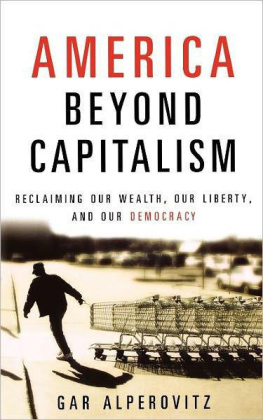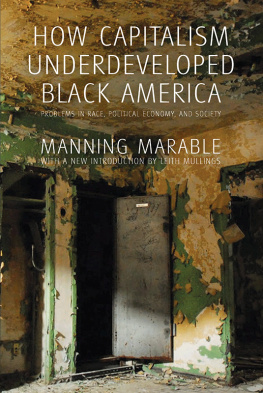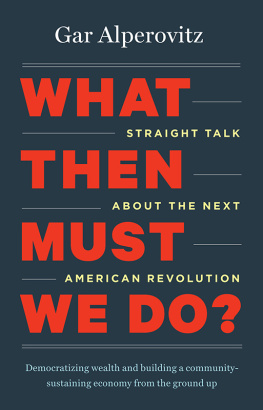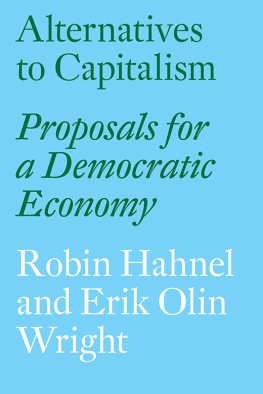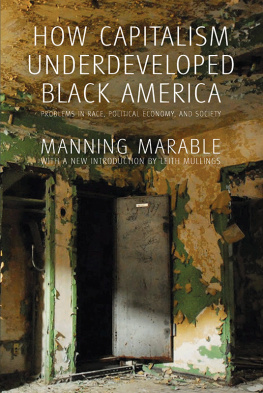





Contents
xiii
Preface
They called it "Black Monday"-the day in 1977 when five thousand workers at theYoungstown Sheet and Tube plant in Ohio were told the mill was going to close. An aggressive group of young steelworkers was dumbfounded. They had put their lives into the mill. Did this really have to happen? Gerald Dickey was the first to have the idea: "There are skills and men here who know how to make steel. Why don't we set this up as a company that we ourselves own-we could do it jointly with the community."
That was the start of a major fight. The religious community, led by the Catholic and Episcopal bishops, put together an ecumenical coalition. I was called in to help (some of the church leaders had read my work). With the support of a couple of creative government officials, we hired top steel industry experts to develop the kind of plan that is now common in successful steel operations.
Then something interesting happened-and we learned two fundamental things, which are at the heart of the following book:
First, the seemingly radical idea of the workers and the community owning and running a giant steel mill was hardly considered radical at all at the grassroots level. Indeed, the vast majority of the community, the local congressional delegation, both senators, and the conservative governor of Ohio, James Rhodes, supported it. The state prepared loanguarantee and other legislation to back the effort. What made sense to ordinary Americans was far different from what many had thought.
The second lesson was equally important. For complicated reasons, Youngstown never got its mill.' However, the struggle to find a new way forward that began on Black Monday continued-and in many parts of Ohio (and elsewhere throughout the United States), worker-owned firms inspired by that initial fight are now commonplace. The second lesson is the lesson of commitment to the long haul.
I am a historian and a political economist. I have been a legislative director in both the U.S. House of Representatives and the U.S. Senate, as well as a high-level policy adviser in the Department of State. I was nominated by leading environmental, consumer, labor, and other national organizations to be a member of the Council of Economic Advisers. I have been a Fellow of Kings College, Cambridge University, of the Institute of Politics at Harvard, and of the Institute for Policy Studies in Washington. I worked with steelworkers in Youngstown and with the Mississippi Freedom Democratic Party and Martin Luther King Jr. at the 1964 Atlantic City Democratic National Convention. I am also a former anti-Vietnam War activist. And I am, lastly and importantly, someone who grew up in a medium-size Midwestern industrial city-Racine, Wisconsin.
I mention these personal facts to underscore several critical aspects of the lessons of Youngstown-and my reasons for writing a book that argues that it is not only necessary but possible to "change the system":
Though I am now a professor with all the usual academic trappings and degrees, I am not primarily an academic. What I have to say about political possibilities is informed, for better or worse, by some rather hardheaded real-world experiences-especially concerning difficult longer-term change. Here are four examples:
First, when I worked in the Senate in the early 1960s it was for Gaylord Nelson-the founder of Earth Day. The idea that environmental issues might one day become important in America seemed far-fetched then. Everyone knew this was a nonstarter. I witnessed close at hand the rise from "nowhere" of what once had been called "conservation" to become the "environmental movement." I view current setbacks and political obstacles with a certain historical sense of the possible, and I view long-run change coming "out of nowhere" as always-minimally!-conceivable (whether the powers that be like it or not).
Second, I recall, vividly and personally, the days in 1965 and 1966 when virtually the entire leadership structure of the nation supported the Vietnam War. The president and the Congress (with only a tiny handful of exceptions), most of the press, and most of the corporate and labor leaders all thought the war right (or at least did not oppose it). In 1965 and 1966 even Martin Luther King refused to challenge the Johnson administration directly on the war.2 I also recall that, contrary to those who said nothing could be done, slowly and steadily a citizens' movement built power and momentum until the war was stopped.
Third, way back when-in my early days in WisconsinSenator Joseph McCarthy of our state dominated politics, both nationally and locally. "They shot anything that moved politically," people used to say. Fear dominated every suggestion that progressive ideas might be put forward. Anyone who thought otherwise was obviously foolish. But of course, what came next was the 1960s. Both those who lament and those who cheer the passing of the 1960s era of activism often read history as if things ended in the 1970s. My reading-from the perspective of Wisconsin in the McCarthydominated 1950s-is that those who say that nothing can be done because reactionaries control everything simply do not recall or do not know how impossible the world felt before the "unexpected" explosions of the 1960s.
Fourth, my personal memories also include the way the civil rights movement developed "out of nowhere"-or so it then seemed-to challenge the oppression that was the American South. The idea that nothing could be done was also rampant in the pre-1960s South-and there it was enforced not simply by reactionary politicians willing to blacklist anyone who spoke up. It was enforced by deadly terror: blacks-and even some white Americans-were murdered for demanding their basic rights. (As a young Senate aide, I drove through Mississippi with civil rights activist Bob Moses, followed at every turn by armed state troopers; the poor farmers we stayed with kept a shotgun by the door.) Those who tell me the opposition to change, now, is so great that nothing can be done would do well to read just a bit about what it was like before the civil rights movement was a movement.3
One final recollection-this one not so close at hand but nonetheless vivid in my life experience as well. Most people forget how marginal conservative thinkers and activists were in the 1950s-and even after the Goldwater debacle of 1964. The ideas and politics that currently dominate American reality once were regarded as antique and ridiculous by the mainstream press, political leadership, and most of serious academic thought. Committed conservatives worked in very difficult circumstances to develop their ideas and practices and politics for the long haul-and though I disagree with them, they, too, have demonstrated what can be done against seemingly long odds.
If you think I am recalling these various experiences and old war stories to suggest that even the most daunting political obstacles can often be overcome by those who are serious, you are right. I am, however, no utopian. I think it is entirely possible that, like Rome, the U.S. empire will fail and decay. Or that our domestic and international troubles will lead to violence and the suppression of what remains of American liberties. Indeed, as I shall suggest, at best I think things are likely to get worse before they get better. I note, however, that Chile has survived even Pinochet. Those who view things historically understand that the challenge is always to build to and through even the worst difficulties.

